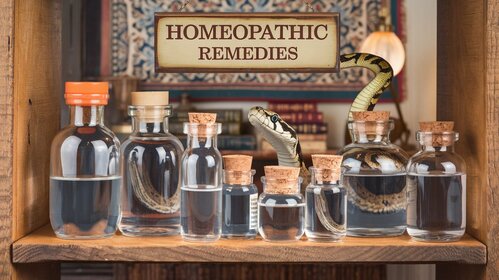Understanding Homeopathy: A Critical Look

The Theory of Homeopathy
Homeopathic medications are often confused with herbal remedies or supplement but they are two entirely different things. Herbal remedies and supplements have actual ingredients which may or may not have some benefit for patients. That can't be said for homeopathic remedies.
Homeopathy was developed in the late 18th century by Samuel Hahnemann, a German physician. The central idea behind homeopathy is based on two key beliefs: "like cures like" and the "law of infinitesimals." The phrase "like cures like" suggests that a substance causing symptoms in a healthy person can be used to treat similar symptoms in someone who is ill. For example, if a person experiences symptoms similar to those caused by onion (such as watery eyes and runny nose), a homeopathic remedy made from onion might be prescribed to alleviate those symptoms.
The second principle, the "law of infinitesimals," suggests that diluting a substance in water or alcohol enhances its healing properties. Homeopaths believe that even after extreme dilutions, the remedy can retain a "memory" of the original substance. This idea suggests that water can somehow remember the substances it has come into contact with, even after those substances have been diluted to the point where none of the original molecules remain.
Homeopathy was developed in the late 18th century by Samuel Hahnemann, a German physician. The central idea behind homeopathy is based on two key beliefs: "like cures like" and the "law of infinitesimals." The phrase "like cures like" suggests that a substance causing symptoms in a healthy person can be used to treat similar symptoms in someone who is ill. For example, if a person experiences symptoms similar to those caused by onion (such as watery eyes and runny nose), a homeopathic remedy made from onion might be prescribed to alleviate those symptoms.
The second principle, the "law of infinitesimals," suggests that diluting a substance in water or alcohol enhances its healing properties. Homeopaths believe that even after extreme dilutions, the remedy can retain a "memory" of the original substance. This idea suggests that water can somehow remember the substances it has come into contact with, even after those substances have been diluted to the point where none of the original molecules remain.
The Process of Serial Dilution
To create homeopathic remedies, practitioners use a process called serial dilution. This involves repeatedly diluting a substance in water or alcohol, often to the point where the final product contains little to no molecules of the original substance. For instance, a common dilution method is known as 30C, which means the original substance has been diluted 1 part to 99 parts of diluent 30 times. After such a process, there would be one molecule of the original substance for every 10030 (or 1060) water molecules, thats a 1 with 60 zeros after it.
To put this in perspective, it is estimated that the final solution may contain only one molecule of the original substance in a volume of water that could fill a sphere so large that if you put the Earth in its center, the outer edge of the watery sphere would extend 50 times further away than the moon is from the earth. Think about that. One single molecule of something smaller than anything you can see even in a common microscope diluted in a volume of fluid so large it extends beyond the moon. That amount of water is equal to 22 trillion times the water in all the earths oceans. If you have ever been on a ship in the ocean or flew over it and looked down you have some idea how incredibly huge that is. Even crazier, a popular homeopathic remedy called Oscillococcinum is often diluted to 200C. That means we would have to have a sphere of water far bigger than the entire known universe to contain even a single molecule of the original substance. Oddly according to homeopathy, the more dilute a preparation is, the stronger it is.
To put this in perspective, it is estimated that the final solution may contain only one molecule of the original substance in a volume of water that could fill a sphere so large that if you put the Earth in its center, the outer edge of the watery sphere would extend 50 times further away than the moon is from the earth. Think about that. One single molecule of something smaller than anything you can see even in a common microscope diluted in a volume of fluid so large it extends beyond the moon. That amount of water is equal to 22 trillion times the water in all the earths oceans. If you have ever been on a ship in the ocean or flew over it and looked down you have some idea how incredibly huge that is. Even crazier, a popular homeopathic remedy called Oscillococcinum is often diluted to 200C. That means we would have to have a sphere of water far bigger than the entire known universe to contain even a single molecule of the original substance. Oddly according to homeopathy, the more dilute a preparation is, the stronger it is.

The extreme dilutions used in homeopathy lead to the conclusion that most homeopathic products are essentially just water or alcohol, which is sometimes is added to inert binders to make tablets but with no active ingredients at all. Despite this, homeopaths claim that the water retains a "memory" of the original substance, supposedly allowing it to influence the body in a healing way. The chemistry and physics of water is well understood and there is no conceivable method by which pure water can maintain a memory of substances it was previously in contact with. Even homeopathic practitioners have not proposed any realistic hypothesis or mechanism for this process.
The Scientific Perspective
Despite its appeal to some individuals, homeopathy has been criticized by the scientific community. Numerous studies and systematic reviews have shown that homeopathic treatments are no more effective than a placebo. A placebo is a substance or treatment with no therapeutic effect that is given to a patient, often in the context of a clinical trial.
The claims made by homeopathy about water retaining memory and the healing properties of diluted substances have not been substantiated by scientific research. The laws of chemistry and physics suggest that once a substance is diluted beyond a point where the active ingredient is present then the substance will no longer retain any of its properties. Furthermore, rigorous testing has consistently shown that homeopathic remedies do not outperform placebos in clinical trials.
The claims made by homeopathy about water retaining memory and the healing properties of diluted substances have not been substantiated by scientific research. The laws of chemistry and physics suggest that once a substance is diluted beyond a point where the active ingredient is present then the substance will no longer retain any of its properties. Furthermore, rigorous testing has consistently shown that homeopathic remedies do not outperform placebos in clinical trials.
Conclusion: Homeopathy is Pseudoscience
While homeopathy may be appealing to some due to the idea that it may seem "natural" and focus on holistic healing, it fundamentally lacks scientific validity. The principles of homeopathy—like cures like and the law of infinitesimals—do not align with what 100's of years of scientific research have taught us about how the world works. The process of serial dilution results in remedies that usually contain not a single molecule of the original ingredient, and the concept of water memory has no basis in fact.
For patients seeking effective treatments, it is crucial to rely on therapies backed by rigorous scientific evidence. Evidence-based medicine has been shown to improve health outcomes, while homeopathy has not demonstrated its efficacy in any meaningful way. As you consider your healthcare options, always consult with qualified healthcare professionals and prioritize treatments supported by science. Understanding the limitations of homeopathy can help you make informed choices about your health and well-being.
For patients seeking effective treatments, it is crucial to rely on therapies backed by rigorous scientific evidence. Evidence-based medicine has been shown to improve health outcomes, while homeopathy has not demonstrated its efficacy in any meaningful way. As you consider your healthcare options, always consult with qualified healthcare professionals and prioritize treatments supported by science. Understanding the limitations of homeopathy can help you make informed choices about your health and well-being.
Citations:
- The Lancet (2005): A meta-analysis by Shang et al. reviewed over 200 homeopathic trials and concluded that homeopathic treatments are not more effective than placebo. This comprehensive analysis indicated that the clinical effects of homeopathy could not be distinguished from placebo effects.
- British Journal of Clinical Pharmacology (2002): The article discusses a study that investigated multiple other studies looking at whether homeopathic treatments are more effective than placebo for various health conditions. The findings suggest that homeopathy does not show significant benefits beyond what you would expect from a placebo.
- Database of Abstracts of Reviews of Effects (DARE) (2000) :Evidence of clinical efficacy of homeopathy: a meta-analysis of clinical trials. The article reviews research on the effectiveness of homeopathy, concluding that high-quality studies generally find no significant benefits compared to placebo. It suggests that while some lower-quality studies reported positive effects, these results may not be reliable. Overall, the evidence does not support the use of homeopathy as a valid treatment option for health conditions.
- National Health and Medical Research Council (NHMRC) of Australia (2021): This comprehensive review concluded that there is no reliable evidence that homeopathy is effective for any health condition.
Recent
Are You Really Allergic to Penicillin? The Truth Might Surprise You
January 19th, 2025
Understanding Homeopathy: A Critical Look
October 25th, 2024
HPV Vaccines - Fact and Fiction
July 5th, 2024
Ear Pressure Problems: Navigating Eustachian Tube Dysfunction
June 24th, 2024
Carotid Doppler/Ultrasound Tests: Who should have this test done?
June 19th, 2024
Archive
2024
May
Ozempic - Obesity cure or panacea?GMO's (Genetically Modified Organisms) - Are they truly "Frankenfoods" or our best hope for feeding a hungry world?The Drip Dilemma: Why Healthy People Should Steer Clear of IV TherapyLung Cancer Screening - Is it time to get a CT scan?The Whole Truth Behind Whole Body MRI Scans – Overhyped, Overpriced, and Overrated!Understanding Sinus Infections: Beyond the Common ColdAbdominal Aortic Aneurysms: What You Need to Know
June
2014
March
May
2013
July
August
October
November
Omega 3's (Fish Oil and Flax Seed Oil) who should take them?How do you save a life ? - Just swab your cheekNew Cholesterol Guidelines - What's changed and what does it mean for you?Antibiotics and Probiotics- Why you shouldn't take either without a good reasonPreventing Heart Disease with almonds- Is this study Nuts?